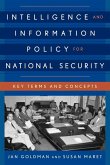Intelligence and the National Security Strategist
Enduring Issues and Challenges
Herausgeber: George, Roger Z.; Kline, Robert D.
Intelligence and the National Security Strategist
Enduring Issues and Challenges
Herausgeber: George, Roger Z.; Kline, Robert D.
- Broschiertes Buch
- Merkliste
- Auf die Merkliste
- Bewerten Bewerten
- Teilen
- Produkt teilen
- Produkterinnerung
- Produkterinnerung
Intelligence and the National Security Strategist: Enduring Issues and Challenges presents students with a useful anthology of published articles from diverse sources as well as original contributions to the study of intelligence. The collection includes classic perspectives from the history of warfare, views on the evolution of U.S. intelligence, and studies on the delicate balance between the need for information-gathering and the values of democratic societies. It also includes succinct discussions of complex issues facing the Intelligence Community, such as the challenges of technical and…mehr
Andere Kunden interessierten sich auch für
![The Amateur Strategist The Amateur Strategist]() James DenardoThe Amateur Strategist109,99 €
James DenardoThe Amateur Strategist109,99 €![The Future of National Intelligence The Future of National Intelligence]() Shay HershkovitzThe Future of National Intelligence107,99 €
Shay HershkovitzThe Future of National Intelligence107,99 €![Strategists And Strategy Strategists And Strategy]() A K GangulyStrategists And Strategy53,99 €
A K GangulyStrategists And Strategy53,99 €![The Palgrave Handbook of National Security The Palgrave Handbook of National Security]() The Palgrave Handbook of National Security177,99 €
The Palgrave Handbook of National Security177,99 €![U.S. National Security and the Intelligence Services U.S. National Security and the Intelligence Services]() Daniel J BennyU.S. National Security and the Intelligence Services174,99 €
Daniel J BennyU.S. National Security and the Intelligence Services174,99 €![The Palgrave Handbook of National Security The Palgrave Handbook of National Security]() The Palgrave Handbook of National Security177,99 €
The Palgrave Handbook of National Security177,99 €![Intelligence and Information Policy for National Security Intelligence and Information Policy for National Security]() Jan GoldmanIntelligence and Information Policy for National Security112,99 €
Jan GoldmanIntelligence and Information Policy for National Security112,99 €-
-
-
Intelligence and the National Security Strategist: Enduring Issues and Challenges presents students with a useful anthology of published articles from diverse sources as well as original contributions to the study of intelligence. The collection includes classic perspectives from the history of warfare, views on the evolution of U.S. intelligence, and studies on the delicate balance between the need for information-gathering and the values of democratic societies. It also includes succinct discussions of complex issues facing the Intelligence Community, such as the challenges of technical and clandestine collection, the proliferation of open sources, the problems of deception and denial operations, and the interaction between the Intelligence Community and the military. Several timely chapters examine the role of the intelligence analyst in support of the national security policymaker. Rounding out the volume are appendices on the legislative underpinnings of our national intelligence apparatus.
Hinweis: Dieser Artikel kann nur an eine deutsche Lieferadresse ausgeliefert werden.
Hinweis: Dieser Artikel kann nur an eine deutsche Lieferadresse ausgeliefert werden.
Produktdetails
- Produktdetails
- Verlag: Rowman & Littlefield Publishers
- Seitenzahl: 618
- Erscheinungstermin: 11. November 2005
- Englisch
- Abmessung: 254mm x 178mm x 33mm
- Gewicht: 1145g
- ISBN-13: 9780742540392
- ISBN-10: 0742540391
- Artikelnr.: 21100596
- Herstellerkennzeichnung
- Libri GmbH
- Europaallee 1
- 36244 Bad Hersfeld
- gpsr@libri.de
- Verlag: Rowman & Littlefield Publishers
- Seitenzahl: 618
- Erscheinungstermin: 11. November 2005
- Englisch
- Abmessung: 254mm x 178mm x 33mm
- Gewicht: 1145g
- ISBN-13: 9780742540392
- ISBN-10: 0742540391
- Artikelnr.: 21100596
- Herstellerkennzeichnung
- Libri GmbH
- Europaallee 1
- 36244 Bad Hersfeld
- gpsr@libri.de
Roger Z. George has recently joined the Sherman Kent Center, part of the CIA University's Sherman Kent School for Intelligence Analysis. He completed a 3-year teaching assignment at the National War College, where he served as the DCI's Faculty Representative from 2001-2004. Dr. George has been a career intelligence analyst at CIA for 25 years and is a member of the Senior Analytic Service (SAS). He has also served as a Policy Planning Staff member in the Department of State from 1989-91, was the National Intelligence Officer for Europe from 1991-1995, and was the Director of the Policy and Analysis Group for the Assistant Secretary of Defense for International Security Affairs, from 1995-1997. Dr. George received his Bachelor of Arts degree in Political Science from Occidental College in 1971 and his Ph.D in International Relations from the Fletcher School of Law and Diplomacy in 1977. He has taught International Politics at Brandeis University, Occidental College, UC Santa Cruz and was a post-doctoral research fellow at Stanford University prior to government service. Robert D. Kline is currently working as an independent consultant after recently retiring from the U.S. Department of Defense, where he served for more than 25 years as a senior executive. He was on the faculty of the National Defense University from 2000-2003, and taught in the Department of National Security Strategy at the National War College. Prior to serving at the Department of Defense, Mr. Kline was a senior analyst at the U.S. General Accounting Office, the investigative arm of Congress, where he also served on the staff of a Member of Congress. Mr. Kline is a native of Washington, D.C. His undergraduate work was in Political Science and History at the University of Maryland, College Park, and he holds graduate degrees from both the University of Maryland and Johns Hopkins University. He is also a graduate of the Federal Executive Institute.
Chapter 1 Foreword Chapter 2 Introduction: Teaching Intelligence Part 3 I
Intelligence and the Strategist Chapter 4 1 Clausewitz on Intelligence
Chapter 5 2 Clausewitz's Contempt for Intelligence Part 6 II Origins and
Future of U.S. Intelligence Chapter 7 3 Origins of the Central Intelligence
Agency: "Those Spooky Boys" Chapter 8 4 Central Intelligence: Origin and
Evolution Chapter 9 5 The Need to Reorganize the Intelligence Community
Part 10 III Intelligence and Democracy Chapter 11 6 Balancing Liberty and
Security Chapter 12 7 Sharing Secrets with Lawmakers: Congress as a User of
Intelligence Chapter 13 8 Partisanship and the Decline of Intelligence
Oversight Chapter 14 9 The Role of the Federal Bureau of Investigation in
National Security Part 15 IV Challenges of Technical Collection Chapter 16
10 Space-Based Surveillance: Reconnaissance Satellites Are a National
Security Sine Qua Non Chapter 17 11 Unclassified Space Eyes Chapter 18 12
Commercial Satellite Imagery Comes of Age Chapter 19 13 "John, How Should
We Explain MASINT?" Chapter 20 14 The Time of Troubles: The U.S. National
Security Agency in the 21st Century Part 21 V The Art of Clandestine
Collection Chapter 22 15 The In-Culture of the DO Chapter 23 16 Espionage
in an Age of Change: Optimizing Strategic Intelligence Services for the
Future Chapter 24 17 Economic Espionage Chapter 25 18 The Ten Commandments
of Counterintelligence Chapter 26 19 A Review of the FBI's Performance in
Uncovering the Espionage Activites of Aldrich Hazen Ames Part 27 VI The
Open-Source Revolution Chapter 28 20 Open-Source Intelligence: New Myths,
New Realities Chapter 29 21 The Strategic Use of Open-Source Information
Chapter 30 22 Open-Source Intelligence: A Review Essay Part 31 VII
Challenges of Intelligence Analysis Chapter 32 23 Defining the Analytic
Mission: Facts, Findings, Forecasts, and Fortunetelling Chapter 33 24 The
Challenge for the Political Analyst Chapter 34 25 Fixing the Problem of
Analytical Mindsets: Alternative Analysis Chapter 35 26 The Intelligence
Community Case Method Program: A National Intelligence Estimate on
Yugoslavia Chapter 36 27 Building Leverage in the Long War: Ensuring
Intelligence Community Creativity in the Fight Against Terrorism Part 37
VIII Deception, Denial, and Disclosure Problems Chapter 38 28 Intelligence
and Deception Chapter 39 29 Miscalculation, Surprise, and U.S. Intelligence
Chapter 40 30 How Leaks of Classified Intelligence Help U.S. Adversaries:
Implications for Laws and Secrecy Part 41 IX Perils of Policy Support
Chapter 42 31 What to Do When Traditional Models Fail Chapter 43 32 What We
Should Demand from Intelligence Chapter 44 33 American Presidents and Their
Intelligence Communities Chapter 45 34 Inside the White House Situation
Room Part 46 X Intelligence and the Military Chapter 47 35 The DCI and the
Eight-Hundred-Pound Gorilla Chapter 48 36 Tug of War: The CIA's Uneasy
Relationship with the Military Chapter 49 37 CIA Support to Enduring
Freedom Chapter 50 38 Working with the CIA Chapter 51 39 U.S. Central
Intelligence Agency Forces: Covert Warriors Chapter 52 Appendix A The
National Security Act: Excerpts Chapter 53 Appendix B Executive Order
12333: United States Intelligence Activites Chapter 54 Appendix C Director
of Central Intelligence Directive 1/1 Chapter 55 Appendix D The USA PATRIOT
Act: A Sketch
Intelligence and the Strategist Chapter 4 1 Clausewitz on Intelligence
Chapter 5 2 Clausewitz's Contempt for Intelligence Part 6 II Origins and
Future of U.S. Intelligence Chapter 7 3 Origins of the Central Intelligence
Agency: "Those Spooky Boys" Chapter 8 4 Central Intelligence: Origin and
Evolution Chapter 9 5 The Need to Reorganize the Intelligence Community
Part 10 III Intelligence and Democracy Chapter 11 6 Balancing Liberty and
Security Chapter 12 7 Sharing Secrets with Lawmakers: Congress as a User of
Intelligence Chapter 13 8 Partisanship and the Decline of Intelligence
Oversight Chapter 14 9 The Role of the Federal Bureau of Investigation in
National Security Part 15 IV Challenges of Technical Collection Chapter 16
10 Space-Based Surveillance: Reconnaissance Satellites Are a National
Security Sine Qua Non Chapter 17 11 Unclassified Space Eyes Chapter 18 12
Commercial Satellite Imagery Comes of Age Chapter 19 13 "John, How Should
We Explain MASINT?" Chapter 20 14 The Time of Troubles: The U.S. National
Security Agency in the 21st Century Part 21 V The Art of Clandestine
Collection Chapter 22 15 The In-Culture of the DO Chapter 23 16 Espionage
in an Age of Change: Optimizing Strategic Intelligence Services for the
Future Chapter 24 17 Economic Espionage Chapter 25 18 The Ten Commandments
of Counterintelligence Chapter 26 19 A Review of the FBI's Performance in
Uncovering the Espionage Activites of Aldrich Hazen Ames Part 27 VI The
Open-Source Revolution Chapter 28 20 Open-Source Intelligence: New Myths,
New Realities Chapter 29 21 The Strategic Use of Open-Source Information
Chapter 30 22 Open-Source Intelligence: A Review Essay Part 31 VII
Challenges of Intelligence Analysis Chapter 32 23 Defining the Analytic
Mission: Facts, Findings, Forecasts, and Fortunetelling Chapter 33 24 The
Challenge for the Political Analyst Chapter 34 25 Fixing the Problem of
Analytical Mindsets: Alternative Analysis Chapter 35 26 The Intelligence
Community Case Method Program: A National Intelligence Estimate on
Yugoslavia Chapter 36 27 Building Leverage in the Long War: Ensuring
Intelligence Community Creativity in the Fight Against Terrorism Part 37
VIII Deception, Denial, and Disclosure Problems Chapter 38 28 Intelligence
and Deception Chapter 39 29 Miscalculation, Surprise, and U.S. Intelligence
Chapter 40 30 How Leaks of Classified Intelligence Help U.S. Adversaries:
Implications for Laws and Secrecy Part 41 IX Perils of Policy Support
Chapter 42 31 What to Do When Traditional Models Fail Chapter 43 32 What We
Should Demand from Intelligence Chapter 44 33 American Presidents and Their
Intelligence Communities Chapter 45 34 Inside the White House Situation
Room Part 46 X Intelligence and the Military Chapter 47 35 The DCI and the
Eight-Hundred-Pound Gorilla Chapter 48 36 Tug of War: The CIA's Uneasy
Relationship with the Military Chapter 49 37 CIA Support to Enduring
Freedom Chapter 50 38 Working with the CIA Chapter 51 39 U.S. Central
Intelligence Agency Forces: Covert Warriors Chapter 52 Appendix A The
National Security Act: Excerpts Chapter 53 Appendix B Executive Order
12333: United States Intelligence Activites Chapter 54 Appendix C Director
of Central Intelligence Directive 1/1 Chapter 55 Appendix D The USA PATRIOT
Act: A Sketch
Chapter 1 Foreword Chapter 2 Introduction: Teaching Intelligence Part 3 I
Intelligence and the Strategist Chapter 4 1 Clausewitz on Intelligence
Chapter 5 2 Clausewitz's Contempt for Intelligence Part 6 II Origins and
Future of U.S. Intelligence Chapter 7 3 Origins of the Central Intelligence
Agency: "Those Spooky Boys" Chapter 8 4 Central Intelligence: Origin and
Evolution Chapter 9 5 The Need to Reorganize the Intelligence Community
Part 10 III Intelligence and Democracy Chapter 11 6 Balancing Liberty and
Security Chapter 12 7 Sharing Secrets with Lawmakers: Congress as a User of
Intelligence Chapter 13 8 Partisanship and the Decline of Intelligence
Oversight Chapter 14 9 The Role of the Federal Bureau of Investigation in
National Security Part 15 IV Challenges of Technical Collection Chapter 16
10 Space-Based Surveillance: Reconnaissance Satellites Are a National
Security Sine Qua Non Chapter 17 11 Unclassified Space Eyes Chapter 18 12
Commercial Satellite Imagery Comes of Age Chapter 19 13 "John, How Should
We Explain MASINT?" Chapter 20 14 The Time of Troubles: The U.S. National
Security Agency in the 21st Century Part 21 V The Art of Clandestine
Collection Chapter 22 15 The In-Culture of the DO Chapter 23 16 Espionage
in an Age of Change: Optimizing Strategic Intelligence Services for the
Future Chapter 24 17 Economic Espionage Chapter 25 18 The Ten Commandments
of Counterintelligence Chapter 26 19 A Review of the FBI's Performance in
Uncovering the Espionage Activites of Aldrich Hazen Ames Part 27 VI The
Open-Source Revolution Chapter 28 20 Open-Source Intelligence: New Myths,
New Realities Chapter 29 21 The Strategic Use of Open-Source Information
Chapter 30 22 Open-Source Intelligence: A Review Essay Part 31 VII
Challenges of Intelligence Analysis Chapter 32 23 Defining the Analytic
Mission: Facts, Findings, Forecasts, and Fortunetelling Chapter 33 24 The
Challenge for the Political Analyst Chapter 34 25 Fixing the Problem of
Analytical Mindsets: Alternative Analysis Chapter 35 26 The Intelligence
Community Case Method Program: A National Intelligence Estimate on
Yugoslavia Chapter 36 27 Building Leverage in the Long War: Ensuring
Intelligence Community Creativity in the Fight Against Terrorism Part 37
VIII Deception, Denial, and Disclosure Problems Chapter 38 28 Intelligence
and Deception Chapter 39 29 Miscalculation, Surprise, and U.S. Intelligence
Chapter 40 30 How Leaks of Classified Intelligence Help U.S. Adversaries:
Implications for Laws and Secrecy Part 41 IX Perils of Policy Support
Chapter 42 31 What to Do When Traditional Models Fail Chapter 43 32 What We
Should Demand from Intelligence Chapter 44 33 American Presidents and Their
Intelligence Communities Chapter 45 34 Inside the White House Situation
Room Part 46 X Intelligence and the Military Chapter 47 35 The DCI and the
Eight-Hundred-Pound Gorilla Chapter 48 36 Tug of War: The CIA's Uneasy
Relationship with the Military Chapter 49 37 CIA Support to Enduring
Freedom Chapter 50 38 Working with the CIA Chapter 51 39 U.S. Central
Intelligence Agency Forces: Covert Warriors Chapter 52 Appendix A The
National Security Act: Excerpts Chapter 53 Appendix B Executive Order
12333: United States Intelligence Activites Chapter 54 Appendix C Director
of Central Intelligence Directive 1/1 Chapter 55 Appendix D The USA PATRIOT
Act: A Sketch
Intelligence and the Strategist Chapter 4 1 Clausewitz on Intelligence
Chapter 5 2 Clausewitz's Contempt for Intelligence Part 6 II Origins and
Future of U.S. Intelligence Chapter 7 3 Origins of the Central Intelligence
Agency: "Those Spooky Boys" Chapter 8 4 Central Intelligence: Origin and
Evolution Chapter 9 5 The Need to Reorganize the Intelligence Community
Part 10 III Intelligence and Democracy Chapter 11 6 Balancing Liberty and
Security Chapter 12 7 Sharing Secrets with Lawmakers: Congress as a User of
Intelligence Chapter 13 8 Partisanship and the Decline of Intelligence
Oversight Chapter 14 9 The Role of the Federal Bureau of Investigation in
National Security Part 15 IV Challenges of Technical Collection Chapter 16
10 Space-Based Surveillance: Reconnaissance Satellites Are a National
Security Sine Qua Non Chapter 17 11 Unclassified Space Eyes Chapter 18 12
Commercial Satellite Imagery Comes of Age Chapter 19 13 "John, How Should
We Explain MASINT?" Chapter 20 14 The Time of Troubles: The U.S. National
Security Agency in the 21st Century Part 21 V The Art of Clandestine
Collection Chapter 22 15 The In-Culture of the DO Chapter 23 16 Espionage
in an Age of Change: Optimizing Strategic Intelligence Services for the
Future Chapter 24 17 Economic Espionage Chapter 25 18 The Ten Commandments
of Counterintelligence Chapter 26 19 A Review of the FBI's Performance in
Uncovering the Espionage Activites of Aldrich Hazen Ames Part 27 VI The
Open-Source Revolution Chapter 28 20 Open-Source Intelligence: New Myths,
New Realities Chapter 29 21 The Strategic Use of Open-Source Information
Chapter 30 22 Open-Source Intelligence: A Review Essay Part 31 VII
Challenges of Intelligence Analysis Chapter 32 23 Defining the Analytic
Mission: Facts, Findings, Forecasts, and Fortunetelling Chapter 33 24 The
Challenge for the Political Analyst Chapter 34 25 Fixing the Problem of
Analytical Mindsets: Alternative Analysis Chapter 35 26 The Intelligence
Community Case Method Program: A National Intelligence Estimate on
Yugoslavia Chapter 36 27 Building Leverage in the Long War: Ensuring
Intelligence Community Creativity in the Fight Against Terrorism Part 37
VIII Deception, Denial, and Disclosure Problems Chapter 38 28 Intelligence
and Deception Chapter 39 29 Miscalculation, Surprise, and U.S. Intelligence
Chapter 40 30 How Leaks of Classified Intelligence Help U.S. Adversaries:
Implications for Laws and Secrecy Part 41 IX Perils of Policy Support
Chapter 42 31 What to Do When Traditional Models Fail Chapter 43 32 What We
Should Demand from Intelligence Chapter 44 33 American Presidents and Their
Intelligence Communities Chapter 45 34 Inside the White House Situation
Room Part 46 X Intelligence and the Military Chapter 47 35 The DCI and the
Eight-Hundred-Pound Gorilla Chapter 48 36 Tug of War: The CIA's Uneasy
Relationship with the Military Chapter 49 37 CIA Support to Enduring
Freedom Chapter 50 38 Working with the CIA Chapter 51 39 U.S. Central
Intelligence Agency Forces: Covert Warriors Chapter 52 Appendix A The
National Security Act: Excerpts Chapter 53 Appendix B Executive Order
12333: United States Intelligence Activites Chapter 54 Appendix C Director
of Central Intelligence Directive 1/1 Chapter 55 Appendix D The USA PATRIOT
Act: A Sketch








